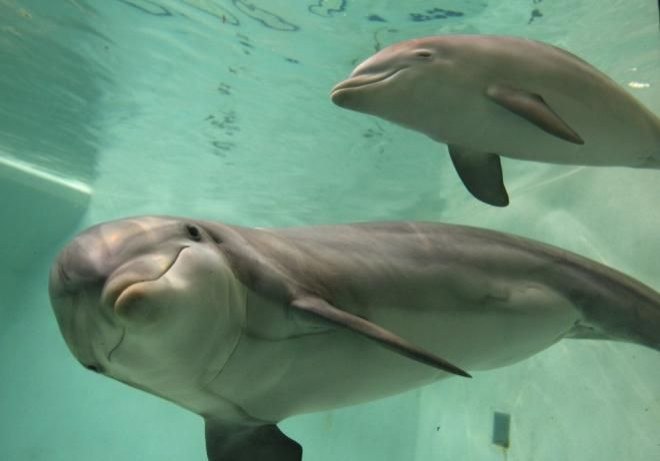Dolphins May Call Each Other By 'Name' With Signature Whistles

When a dolphin chatters, squeaks or whistles, it might be calling out to a friend, according to a new study.
Scientists have known for some time that a dolphin’s vocalizations have special qualities – dolphins seem to be able to recognize certain whistles, even if produced by a computer-generated voice, suggesting that the signature of a particular whistle might have a "name" distinct from the "voice" of an individual dolphin.
In a new study, researchers from the University of St. Andrews, the Woods Hole Oceanographic Institution, the Chicago Zoological Society and the Seas, an aquarium at Walt Disney World, sought to find out why dolphins will sometimes copy the signature vocalizations of others. What wasn't clear was exactly what this copying could be -- a courting tactic, a challenge, or something more refined like communication?
They sifted through data collected on the social relationships and vocalizations of wild bottlenose dolphins around Sarasota Bay in Florida between 1984 and 2009. When these wild dolphins are captured for study, they’re held in separate nets, unseen to each other but still able to communicate.
Dolphins would copy each other’s signature whistles while being studied, and the pairs most likely to copy each others’ whistles were males with close social ties, and mothers and calves, according to results published Wednesday in Proceedings of the Royal Society B.
“They use these when they want to reunite with a specific individual,” lead author Stephanie King, a biologist with the University of St. Andrews, told Wired. “It’s a friendly, affiliative sign.”
One possible explanation is that the copied signal contains something akin to a dolphin's name. It makes sense: imagine you are separated from a friend, or that you are suddenly missing your child – the first thing you are likely to do is call out the other person’s name.
“We learn language and refer to objects. This has been shown with captive dolphins and captive gray parrots, but hasn’t been seen in the natural communication system of any species,” King said. “We’re not saying that this is what they’re doing, but we’re definitely suggesting that we should look into it.”
The scientists didn't observe any aggression between the pairs after they were released, which suggests the mimicry wasn’t part of some territorial vocalization or challenge, as some bird calls are known to signify.
“This use of vocal copying is similar to its use in human language, where the maintenance of social bonds appears to be more important than the immediate defense of resources,” the authors wrote.
The dolphins also added slight modifications to the sounds that they were copying, suggesting they were relaying information to their separated companions while being studied by the researchers.
Other researchers, however, are hesitant to project too many human-like qualities onto these animals. Dolphins are charismatic and intelligent creatures, so it’s easy to think of them communicating like we humans do. But there’s still a lot of work to be done before researchers can definitively say that dolphins have language skills on par with a human’s ability to learn how sounds can refer to other individuals.
Robert Barton, a Durham University researcher, signaled his skepticism in an interview with Wired, saying there’s still a lack of evidence that can rule out other explanations for the whistle-copying phenomenon.
SOURCE: King et al. “Vocal copying of individually distinctive signature whistles in bottlenose dolphins.” Proceedings of the Royal Society B published online Feb. 20, 2013.
© Copyright IBTimes 2024. All rights reserved.





















